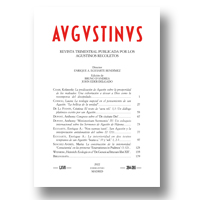|
|
|
21.
|
Augustinus:
Volume >
56 >
Issue: 220/221
Ronnie J. Rombs, Enrique Eguiarte
‘Vinculum pacis’: Ef 4, 3 en la pneumatología de Agustín
abstract |
view |
rights & permissions
| cited by
The article describes the elements of Augustine’s Pneumatology that are discernable from his use of Eph 4:3, stating that it does not deny the transparent Christological context that dominates Augustine’s thinking, showing that much of Augustine’s theology of the Holy Spirit is to be found within the context and subordinate to his Christology.
|
|
|
|
|
|
|
22.
|
Augustinus:
Volume >
56 >
Issue: 220/221
Paula Rose, Enrique Eguiarte
Cohesión textual en ‘De cura pro mortuis gerenda’ de Agustín
abstract |
view |
rights & permissions
| cited by
The article deals with Augustine’s De cura pro mortuis gerenda showing that the section with the narratives about dreams and visions in which both deceased and living persons appear, is connected tightly with the foregoing part of the treatise through linguistic devices. It shows also that the third section of the work is not a digression, but an essential element in the argumentation.
|
|
|
|
|
|
|
23.
|
Augustinus:
Volume >
56 >
Issue: 220/221
Matthias Smalbrugge, Enrique Eguiarte
La belleza y la gracia en Agustín
abstract |
view |
rights & permissions
| cited by
The article examines certain aspects of Augustine’s notion of beauty, and limits to the Latin word pulchritudo and its derivatives. Other words as speciosus, formosus or decorus are not considered.
|
|
|
|
|
|
|
24.
|
Augustinus:
Volume >
56 >
Issue: 220/221
Kenneth B. Steinhauser, Enrique Eguiarte
Virgilio, Ciceron y el ‘rusticanus’: ‘Acad’. 3, 34-35
abstract |
view |
rights & permissions
| cited by
The article deals with Augustine's refutation of skepticism as it is recorded in two parables which are analyzed in his Against the Academics, highlighting his ideas and the influence of Virgil and Cicero.
|
|
|
|
|
|
|
25.
|
Augustinus:
Volume >
56 >
Issue: 220/221
Michael W. Tkacz, Enrique Eguiarte
Agustin, el ‘Timeo’ y la falacia cosmogonica
abstract |
view |
rights & permissions
| cited by
The article draws the attention to Augustine’s appropriation of Plato’s argument for the existence of a cosmic demiurge at Timaeus 27d-28c. It presents how Augustine implicitly confronts the Cosmogonical Fallacy, making some amendments to Plato’s argument to preserve it as a philosophical model of cosmic origins for the theist.
|
|
|
|
|
|
|
26.
|
Augustinus:
Volume >
56 >
Issue: 220/221
Tarmo Toom, Enrique Eguiarte
Agustín aprende a expresarse: "Confesiones’ 1,13
abstract |
view |
rights & permissions
| cited by
The article presents the over-all epistemological framework of Augustine’s remarks and to his comments on ostensive learning of language, especially in some texts of the Confessions.
|
|
|
|
|
|
|
27.
|
Augustinus:
Volume >
56 >
Issue: 220/221
Marie-Anne Vannier, Enrique Eguiarte
Luz e iluminación en Agustín:
relectura de una cuestión ya antigua
abstract |
view |
rights & permissions
| cited by
The article deals with the light and the illumination in the work of Augustine, showing that he uses those terms to talk about God and the sharing in his life. It also deals with the relationship that the light has with his Christology and other related topics.
|
|
|
|
|
|
|
28.
|
Augustinus:
Volume >
56 >
Issue: 220/221
Dorothea Weber, Enrique Eguiarte
Observaciones sobre ‘Locutiones in heptateuchum’ de Agustín
abstract |
view |
rights & permissions
| cited by
In the article after the introductory remarks, two topics are discussed, to know if Augustine’s Locutiones in Heptateucum is complete, and which purpose had Agustine with this work.
|
|
|
|
|
|
|
29.
|
Augustinus:
Volume >
56 >
Issue: 220/221
Jonathan Yates, Enrique Eguiarte
El uso de Rm 2, 14-15 en la tradición cristiana latina, ca. 365-ca. 411, excepto Agustín
abstract |
view |
rights & permissions
| cited by
The article offers an analysis of some of the extant evidence regarding the ways several of Augustine’s Latin predecessors and contemporaries interpreted and applied the difficult assertions found in Rom. 2:14-15.
|
|
|
|
|
bibliografía |
|
30.
|
Augustinus:
Volume >
56 >
Issue: 220/221
Bibliografía Agustiniana
view |
rights & permissions
| cited by
|
|
|
|
|
31.
|
Augustinus:
Volume >
56 >
Issue: 220/221
Bibliografía General
view |
rights & permissions
| cited by
|
|
|
|
|
|
|
32.
|
Augustinus:
Volume >
56 >
Issue: 220/221
Libros Recibidos
view |
rights & permissions
| cited by
|
|
|
|

